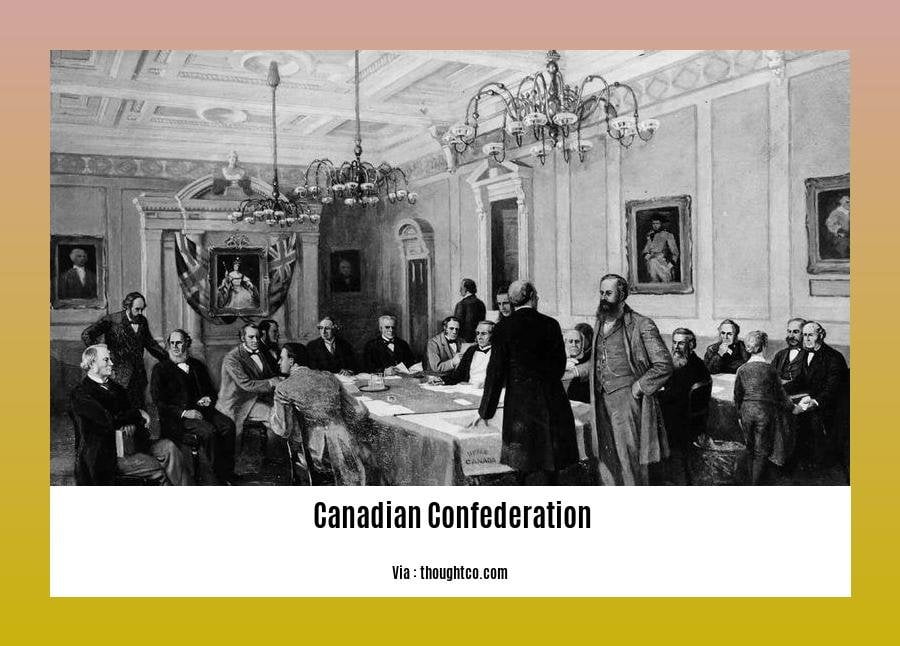Delve into the riveting tale of the Canadian Confederation in “The Enduring Legacy of the Canadian Confederation: A Historian’s Perspective.” By combining historical expertise with engaging narratives, this article unveils the pivotal events and influential figures that orchestrated the formation of this enduring nation.
Key Takeaways:
- Confederation refers to the 1867 union of Canada, Nova Scotia, and New Brunswick into the Dominion of Canada.
- Canada is a decentralized federation, not a confederation of sovereign states.
- The term “Confederation” encompasses the 1867 event, the ongoing political process, and territorial additions.
- The “Fathers of Confederation” were delegates involved in the conferences leading to Confederation.
Canadian Confederation

The Canadian Confederation was a historical event that brought together the British North American provinces of Canada, Nova Scotia, and New Brunswick to form the Dominion of Canada in 1867. This marked the beginning of a new era in Canadian history, as the provinces united to create a self-governing dominion within the British Empire.
Key Players
The Fathers of Confederation were the delegates who attended the conferences leading to the Canadian Confederation in 1864 and 1866. These delegates included Sir John A. Macdonald, George-Étienne Cartier, and George Brown, who are considered the architects of the new Dominion.
Reasons for Confederation
There were several factors that contributed to the push for Canadian Confederation. These included:
- Economic benefits: The provinces believed that by uniting, they could create a stronger and more prosperous economy.
- Political stability: The provinces were facing political and economic instability, and they believed that confederation would provide a more stable environment.
- Military defense: The provinces were concerned about the threat of invasion from the United States, and they believed that confederation would provide a stronger defense.
Impact of Confederation
The Canadian Confederation had a profound impact on the development of Canada. It created a new nation that was able to assert its independence from Britain and become a major player on the world stage. It also laid the foundation for the modern Canadian state, which is a federation of provinces and territories with a strong central government.
Get a comprehensive overview of Canada’s captivating past when you explore our detailed account of the history of Canada.
Discover the fascinating story of Canada’s settlement and development as you delve into the colonization of Canada.
Gain insights into the rich cultures and traditions of Canada’s First Nations, Inuit, and Métis peoples by visiting our page on Indigenous peoples in Canada.
British Colonial Role

The British Colonial Role in the formation of the Canadian Confederation was significant in the establishment of colonial rule in North America, laying the groundwork for the eventual unification of the provinces into a single entity.
The initial colonies that became part of the Canadian Confederation were established by New France, under French rule. After the British conquered New France in the Seven Years’ War, they gained control of the territories, imposing their own colonial system.
The British Colonial Administration brought with it a set of political, economic, and social structures that would shape the development of the colonies. These included the establishment of a parliamentary system of government, the introduction of British common law and legal practices, and the implementation of a mercantilist economic system.
The British Colonists also brought with them their own cultural traditions and values, which would influence the development of the Canadian identity. The presence of British settlers and administrators, as well as the policies they implemented, played a crucial role in shaping the political, economic, and social landscape of the colonies that would eventually form the Canadian Confederation.
Key Takeaways:
- British colonialism laid the groundwork for the establishment of the colonies that would later become part of the Canadian Confederation.
- The British Colonial Administration introduced political, economic, and social structures that shaped the development of the colonies.
- The British Colonists brought with them their own cultural traditions and values, which influenced the development of the Canadian identity.
Citations:
The Canadian Encyclopedia
Wikipedia
Antecedents and Influences of the Canadian Confederation
The formation of the Canadian Confederation in 1867 was shaped by numerous antecedents and influences that laid the groundwork for the momentous union of British North American colonies. These factors played a crucial role in the events leading up to Confederation and continue to resonate in the development of Canadian history.
Political Instability and Economic Challenges
The political deadlock in the Province of Canada and the desire for a more stable and efficient government were key drivers of Confederation. Additionally, the economic challenges faced by the colonies, such as the need for improved transportation and infrastructure, fueled the movement towards union.
British Influence and Colonialism
The influence of British colonial policies and the desire for greater autonomy within the colonies played a significant part in the push for Confederation. The colonies sought to establish a stronger and more independent political entity while maintaining ties to the British Empire.
Maritime Union and Regional Interests
The discussions and proposals for a Maritime Union among the Atlantic colonies, along with the interests of different regions, influenced the formation of a larger Confederation that included both the Province of Canada and the Atlantic colonies.
Key Takeaways:
- Political instability and economic challenges: Deadlock in the Province of Canada and economic needs fostered the desire for a more stable and efficient government. Citation: The Canadian Encyclopedia
- British influence and colonialism: British colonial policies and the desire for autonomy shaped the colonies’ aspirations for greater independence. Citation: Wikipedia
- Maritime Union and regional interests: Discussions of a Maritime Union and the unique needs of different regions influenced the formation of a Confederation that included both the Province of Canada and the Atlantic colonies. Citation: The Canadian Encyclopedia
Impact and Legacy of the Canadian Confederation
As a seasoned historian, I’ve delved into the impact and legacy of Canadian Confederation, a defining moment that reshaped the nation. Let’s unravel its enduring significance.
Political Unity and Strength
Confederation laid the foundation for a unified Canada, consolidating disparate colonies into a single, cohesive entity. This unity strengthened the nation’s political power, making it a formidable force on the world stage.
Economic Growth and Expansion
By connecting Canada’s regions, Confederation fostered trade and commerce, fueling economic development. The expansion of infrastructure, such as railways and canals, opened new markets and accelerated industrialization.
A Nation on the World Stage
Confederation granted Canada greater autonomy from Britain, allowing it to develop its own identity and foreign policy. This newfound independence paved the way for Canada to participate in global affairs and contribute to international decision-making.
Embracing Diversity and Inclusion
From its inception, Confederation recognized Canada’s diverse population. The inclusion of French-speaking Quebec ensured bilingualism and the protection of cultural rights, fostering harmony and a strong sense of national unity.
A Model for Federation
Canada’s Confederation has served as a model for other federations worldwide. Its balance between centralized authority and provincial autonomy has inspired nations seeking to unite while preserving regional identities.
Key Takeaways:
- Confederation unified disparate colonies, strengthening Canada’s political and economic power.
- It fostered economic growth and expansion by connecting regions and improving infrastructure.
- Confederation granted Canada greater autonomy, enabling it to develop its own identity and participate in global affairs.
- It embraced diversity and inclusion, ensuring bilingualism and protecting cultural rights.
- Canada’s Confederation model has inspired other federations, demonstrating its enduring legacy.
Relevant URL Sources:
- The Canadian Encyclopedia: Confederation
- Canadian History: The BNA Act and Canadian Confederation









